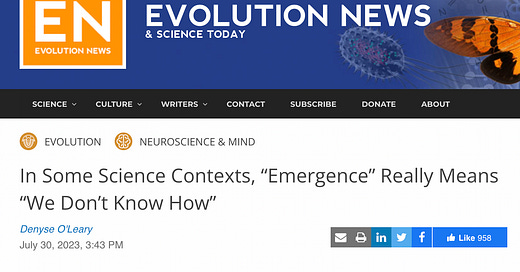I was once in a faculty meeting when someone said something about when Life first appeared.
I said, “appeared to who?”
No, like when it first appeared.
“Appeared to who ?” I repeated.
No, like, I mean, began. When it first emerged.
“Ah, emerged,” I said.
How well do you understand philosophical issues in the theory of evolution ?
Taking time to notice that there are philosophical issues in evolution is a start. Many never make it there.
Here’s one such issue: the definition of the term “emergence.” The term is thrown about, but does it have any content ?
This short piece with relevant quotations is an excellent point of reflection . It argues that evolutionists use the term “emergence” either entirely without semantic content or without knowing what the term signifies at all.
Enjoy, and let me know what thoughts emerge as you read it.
Luke,
[Photo 1: by Lucas Mather, the Evolution News website, “In Some Science Contexts, ‘Emergence’ Really means ‘We Don’t Know How’” by Denyse O’Leary, 30 July 2023 accessed 7 August 2023]





Since you brought up philosophical issues of evolution, I'll build on it. Since the Enlightenment period when "cogito, ergo sum" (I think, therefore I am) philosophy began to take hold, then beauty, truth and goodness began to be judged no longer on objective, but rather on subjective, criteria. This subjective philosophy has fully blossomed. For example, "beauty is in the eye of the beholder," "that's your truth but this is my truth," and "If it feels right, then it must be good."
In today's scientism, it is dogma that the theory of macroevolution is settled science, as shown in high school and undergraduate biology textbooks. Yet, behind closed doors the 'experts' are wresting with the absurdities that they must believe in, such as nothing (different from zero) can beget something, or something lesser can give something it doesn't have.